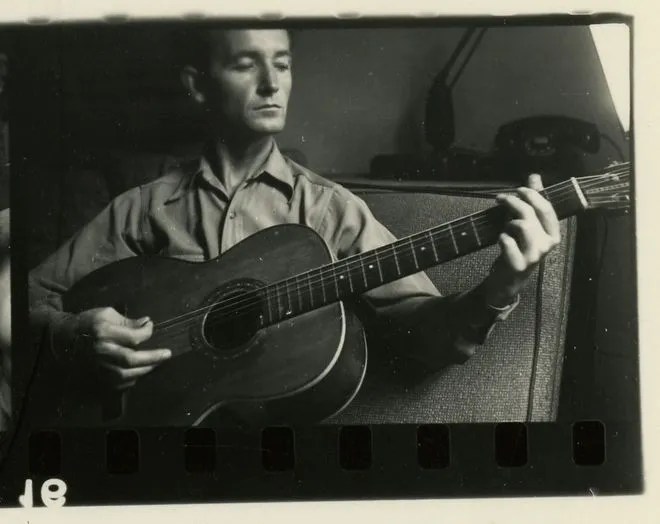
Review: Woody Guthrie’s Home Recordings Reveal an Intimate Final Chapter
When Woody Guthrie began these home recordings in 1951, his health was already failing. By the time he finished them the following year, he was about to enter Brooklyn State Hospital for the first time—a turn that marked the final 16 years of his life with Huntington’s disease. In that brief window at home, he recorded more than 300 performances across 32 tapes. This collection gathers 22 of them—including 13 Guthrie songs heard nowhere else—each one a revelation.
Some of the songs are so fresh they’re sung a cappella, offering what Guthrie called “a sort of rough, dim hint, or little sometimes just a vague suggestion of really what I want to get at in a song.” Even the ones we know are dramatically different from anything we’ve heard before: “This Land Is Your Land” comes with new verses, sweetened with images of Brooklyn mailboxes, doorsteps, and a house built by love. “Pastures of Plenty” is recorded at half the speed (and half the energy) of the version we’ve heard on recordings made for release.
“Jesus Christ” is sung in his lowest register, without any accompaniment except a creaky chair and a crinkling lyric sheet. “Deportee” (aka “Plane Wreck at Los Gatos”), the only known recording of Guthrie playing this song, is delivered in first-person singular, emphasizing the lives of these lost migrants rather than just their nameless, faceless deaths in the versions we’ve known ever since.
And the songs we don’t know? “Backdoor Bum and the Big Landlord” imagines a musical conversation outside the Pearly Gates between Guthrie and Fred Trump, father of a future president. “My Id & My Ego” reports on his conflicted feelings each time his wife takes off her stockings, unzips her dress, and walks through their Coney Island apartment shaking her hips.
At its most hard-hitting, in “I’m a Child Ta Fight,” Guthrie rededicates himself to fighting fascists, bragging about his centuries as a soldier, his hundreds of victories, and what’s going to happen the next time he picks up his “ole squirrely gun.” At its most profound, in “Lifebelt Washed Up,” he wonders whose life was lost at sea, thinking back to his years in the merchant marine.
Single mic reel-to-reel tape recorder, 1950. Sabrina Asch Photography.These are all great songs, strong enough to make us laugh, cry, and head out to the barricades. They show a 40-year-old Guthrie who’s still as playful as a child, following inspiration wherever it takes him, and dividing his attention between fatherhood and nuclear war. Given the condition of the actual recordings, these restorations are astonishingly clear, and though some performances sound more polished than others, they’re all about as naked as can be, with Woody determined to please his publisher, provide for his family, and commit these songs to tape before they’re all forgotten.











